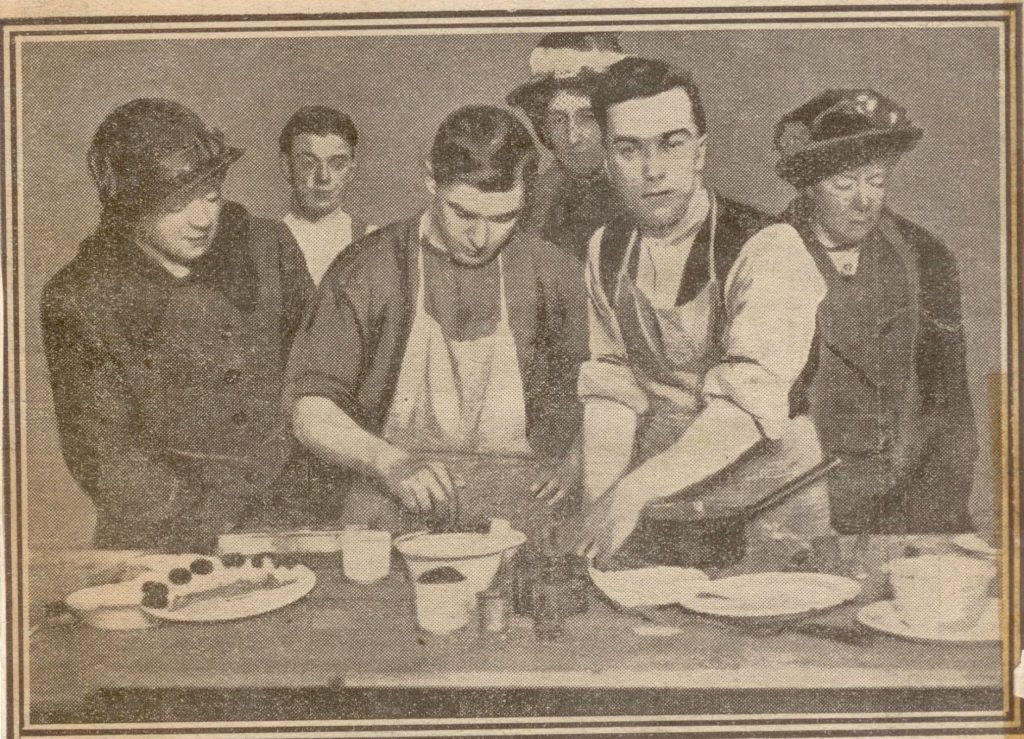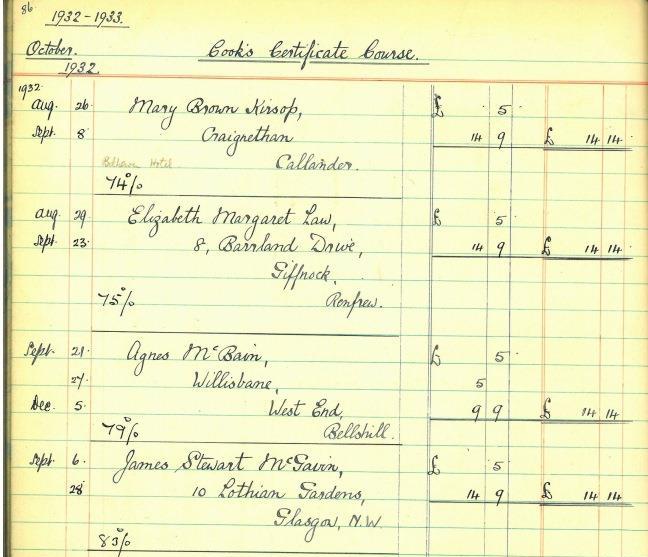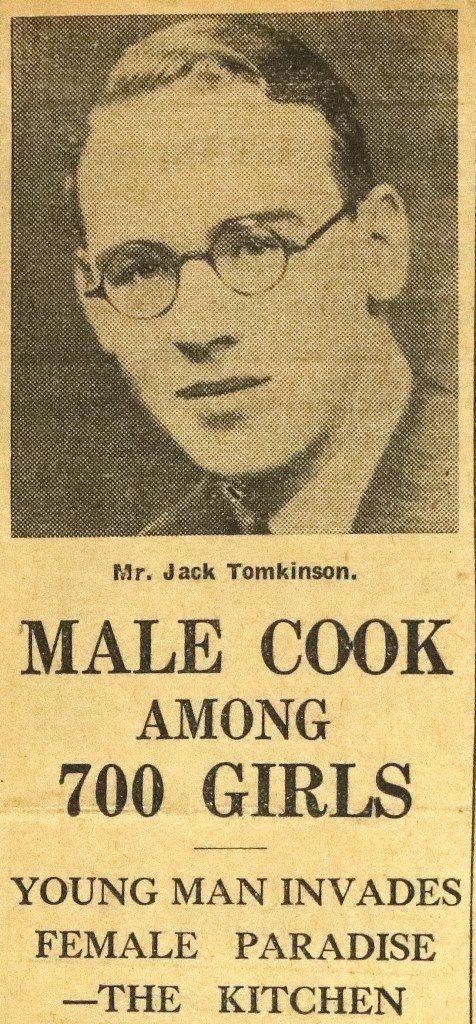A Wellcome Trust Research Resources Project
Usually when we hear about education in the early 20th century it is of a sphere dominated by men. Male professors, teachers and students thrived in a world where women were generally regarded as the lesser sex. But at the Glasgow and West of Scotland College of Domestic Science the opposite was true. It was an institution led by a succession of women Principals who championed the role of women in education. Thousands of women entered its doors to be trained in Cookery, Housewifery, Laundrywork, Dressmaking, as teachers of Domestic Science, Dieticians and Institutional Managers. Upon glancing at the student registers and class photographs – seeing them full of names and faces of women – one may think men were barred from entry. However, this was not the case.
The first male students appeared in April 1915. This was during World War I and soldiers had to cook for large numbers of servicemen in camps at home and overseas. The ‘Soldier Cooks’ course provided 3 weeks training in plain cooking with an examination at the end to test practical skills. The course was run at the Colleges premises at 1 Scott Street, Glasgow, and aimed to deliver soldiers who could cook nutritious meals to sustain an army ‘marching on its stomach’ whilst ensuring that scarce food supplies were not wasted. By 1917 a total of 174 soldier cooks had passed through the College doors. At the war’s end these courses stopped but the teaching of male students did not.
In the 1920s the College ran other courses for male groups, such as the training of 14 boys from Glasgow restaurants, financed by the Glasgow and District Restauranteurs and Hotelkeepers’ Association in 1926. There were also courses for Boy Scouts to improve the standard of cooking at scout camp. Along with this, the College conducted the examination of Ships’ Cooks and Stewards for the Shipping Federation. Of course, it was one thing taking lessons within a group of men compared to taking the step of being the sole male amongst hundreds of women. But there were a few individuals who braved the rigours of being a minority male (and the jibes of their peers) to study at the College.
Contemporary press notes that some of these men were adventurers: the explorer heading to the Himalayas – perhaps more daunted by the prospect of studying with women than climbing the world’s tallest mountains. Or another heading to the Canadian wilderness, who with a future living among grizzly bears could surely survive 3 months with the opposite sex! But not all were intrepid travellers; some were driven by the ambition to run their own business.
One such student was James Stewart McGavin, who had been an architect in Glasgow for 11 years before studying for the Cook’s Certificate at the College in September 1932. It was a 3 month full-time course which included “Practice and demonstration lessons in artisan, household and high-class cookery and in cooking dinners, arranging Menus for Luncheons, dinners, Suppers etc.”
McGavin commented on studying amidst all the women at the college
… it was very embarrassing at first, but after a few days I got quite used to it.
It may have been his determination to run a Highland Hotel that helped to overcome his initial embarrassment but one imagines he soon found that the women weren’t so different to him. Besides that, they too were focused on learning their trade and making a success of their careers. His efforts were rewarded when he became the owner of the Inchrie Hotel, Aberfoyle. One customer, on hearing of McGavin’s student days as a lone male, described him as “a brave man and the best cook whose food I have ever tasted.” He also continued to practice as an architect, which came in handy when he needed plans drawn up to extend the hotel.
A similar student with dreams of running his own restaurant was 19 year old John Joseph Goodwin Tomkinson, known as Jack. He paid the fee of £14 14s to study the Cook’s Certificate at the College in January 1935. Prior to starting the course he had spent several months in a hotel to learn the practical aspects of managing a business. He wanted to learn the business from top to bottom and went on to study further at the College, taking the Advanced Cookery Certificate, a course in book-keeping and the Institutional Training course.
Other men had different reasons for studying cookery at the College. For instance, there was the submarine cook whose vessel had just had its first electric cooker installed and wanted to learn how to use it. In fact, in May 1930, Margaret Bondfield, Minister for Labour, jokingly commented at the AGM of the Electrical Association for Women that “As soon as cooking becomes an easy , simple job you will find men tumbling over themselves to take over this branch of trade”. Some of her words ring true today as we see the world of chefs dominated by men, although the reasons for this are more complex than simply that the “dreary drudgery has been abolished by electricity”.
The myth of the College being a female only domain was well and truly put to bed in August 1976 when the first male Principal, Geoffrey Richardson, took the helm. By then there was a higher percentage of men studying at the College than in decades past. However, students like Alistair Atterson, graduating with an HND in Institutional Management in October 1981 could still cause a stir in the press as the only man to receive an award among the other 28 female prizewinners.
Throughout the decades the Press was always quick to pick up on the novelty of male students surrounded by women. Now, almost 40 years on, women and men have much more of an equal footing in the workplace. With equal pay and rights against discrimination the focus is on skill rather than gender and the College has a long legacy of developing those culinary skills.
Kirsty Menzies
Wellcome Trust funded Project Archivist
References
Newscuttings Books 1913-24, 1924-31, 1931-43, 1975-84
Fees books, Cooks Certificates and Institutional Training Courses 1928-33, 1934-35
Glasgow and West of Scotland College of Domestic Science, Prospectus Session 1934-35
McCallum, Carole “History of the Institution: Report 1875-1918”
McCallum, Carole “History of the Institution: Report 1918-1945”
“Hotel extensions in Dunblane, Lochearnhead and Aberfoyle” Stirling Archives, 30 May 2016. Online at http://www.stirlingarchives.scot/2016/05/30/hotel-extensions-dunblane-lochearnhead-aberfoyle/ [Accessed: 26/01/2018].


